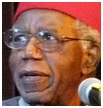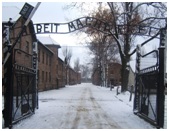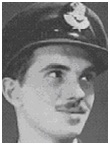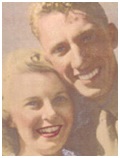|
 |
|
 |
Poetry - The Holocaust and World War Two
Martin Niemöller (1892-1984), First they came for the Communists (1946) Niemöller (pictured right) was a Lutheran minister who opposed the Nazis in Germany in the
1930’s. In this poem he explains how easy it is to be a coward in the face of tyranny: And I didn't speak up Because I wasn't a Communist And then they came for the trade unionists And I didn't speak up Because I wasn't a trade unionist And then they came for the Jews And I didn't speak up Because I wasn't a Jew And then they came for me And by that time there was no one left to speak up (complete poem - there are many other versions but this was approved by Niemöller as the original)
Barbara Sonek, Holocaust
The American poet, a Holocaust survivor, describes how horrible it was:
We played, we laughed we were loved. We were ripped from the arms of our parents and thrown into the fire. We were nothing more than children. We had a future. We were going to be doctors, lawyers, rabbis, wives, teachers, mothers. We had dreams, then we had no hope. We were taken away in the dead of night like cattle in cars, no air to breathe smothering, crying, starving, dying. Separated from the world to be no more. From the ashes, hear our plea. This atrocity to mankind can not happen again. Remember us, for we were the children whose dreams and lives were stolen away. (complete poem)
Chinua Achebe (1930-2013), Vultures The Nigerian poet (pictured right) observes how good must exist with evil The vulture-like Commandant of the Belsen concentration camp is the “perpetuity of evil” (last line) but gives his child chocolate:
...Thus the Commandant at Belsen Camp going home for the day with fumes of human roast clinging rebelliously to his hairy nostrils will stop at the wayside sweet-shop and pick up a chocolate for his tender offspring waiting at home for Daddy's return... (third verse)
Primo Levi (1919-87), If This Is a Man (1947) Levi (pictured right), an Italian Jew and survivor of Auschwitz concentration camp, implores people not to forget the horrors of the Holocaust, when (in lines 7-9): a man:
The last 8 lines read:
I commend these words to you. Carve them in your hearts At home, in the street, Going to bed, rising; Repeat them to your children, Or may your house fall apart, May illness impede you, May your children turn their faces from you.
Pavel Friedmann, The Butterfly
(1942) Friedmann who died at Auschwitz (pictured right) in 1944, wrote this in the Theresienstadt Ghetto in Czechoslovakia, It became a poem of remembrance for children of the Holocaust:
He was the last. Truly the last. Such yellowness was bitter and blinding Like the sun’s tear shattered on stone. That was his true colour. And how easily he climbed, and how high, Certainly, climbing, he wanted To kiss the last of my world. I have been here seven weeks, ‘Ghettoized’ Who loved me have found me, Daisies call to me, And the branches also of the white chestnut in the yard. But I haven’t seen a butterfly here. That last one was the last one. There are no butterflies, here, in the ghetto. (complete poem)
Leo Marks (1920-2001), The Life That I Have
(1943) Marks (pictured right) worked for the British wartime spy organization, the SOE (Special Operations Executive) and wrote it in memory of his dead girlfriend. This became:
The life that I have Is all that I have And the life that I have Is yours. The love that I have Of the life that I have Is yours and yours and yours. A sleep I shall have A rest I shall have Yet death will be but a pause.
For the peace of my years In the long green grass Will be yours and yours and yours. (complete poem)
John Magee (1922-1941), High Flight Magee (pictured right) was an American Spitfire pilot who started flying for Britain in 1941 and was killed soon after.
Oh, I have slipped the surly bonds of earth and danced the skies on laughter-silvered wings. Sunward I've climbed, and joined the tumbling mirth of sun-split clouds, and done a hundred things you have not dreamed of - wheeled and soared and swung high in the sunlit silence. Hovr'ring there, I've chased the shouting wind along, and flung my eager craft through footless halls of air.
Up, up, the long, delirious, burning blue, I've topped the windswept heights with easy grace where never lark, or even eagle flew. And while with silent, lifting mind I've trod the high untrespassed sanctity of space, put out my hand, and touched the face of God. (complete poem)
Can You Take It? (poet unknown)
This poem was written by a prisoner of war on the wall of a German interrogation centre:
You know there is a saying That sunshine follows rain, And sure enough you'll realize That joy will follow pain. Let courage be your password, Make fortitude your guide; And then instead of grousing, Just remember those who died. (last verse)
Fran Chumley, For Ever More (1944) The American poet describes the delight of hearing that her husband and bomber pilot, Perk, pictured right at their wedding in 1943, is alive and a prisoner of war. They celebrated their 60th wedding anniversary in 2003.
After waiting for two long unhappy months, The message arrived one day. It was the news I had been praying for So I was Happy and gay. “In Germany”, the message read "Your husband's a prisoner of war". To me that's music to my ears, He is mine for ever more. |
|
|
||
|
|
|
||
|
||
| Copyright © wisdomtowin.com All Rights Reserved | ||
|









